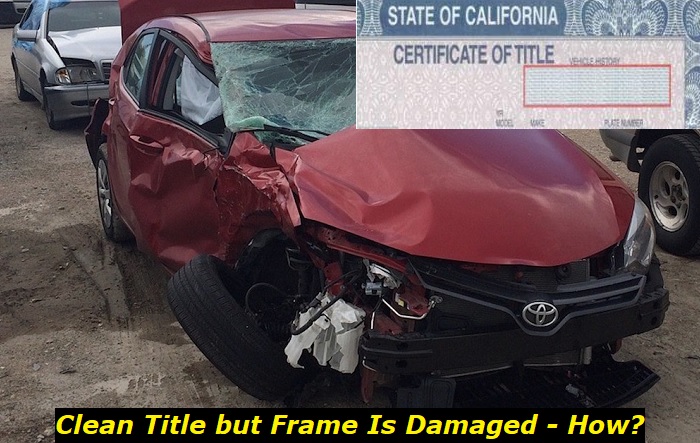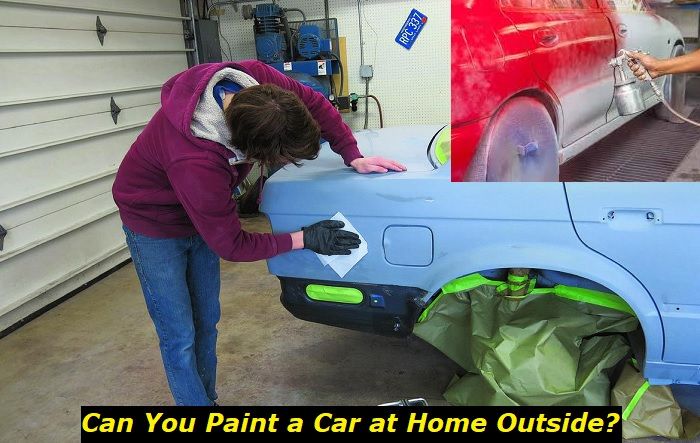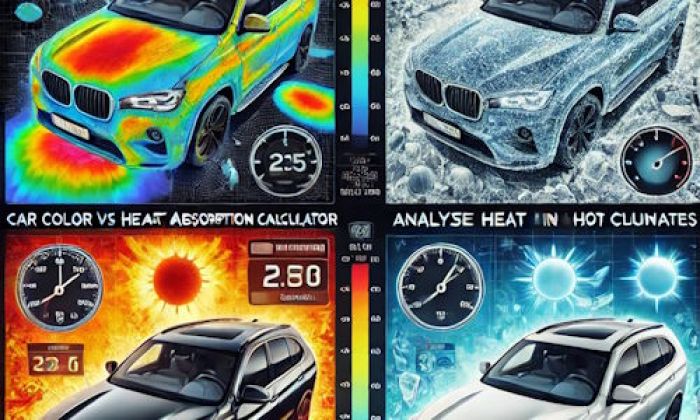If you're looking to buy yourself a nice used car, finding one with "frame damage but a clean title" can be a bit strange. A clean title usually means a car that has never suffered any major "total loss" damage, was flood-damaged or got stolen.
Be that as it may, frame damage is indeed a problem as it indicates a car has bit in quite a severe accident. If the frame is damaged/bent to a point where it obviously threatens the car's structural integrity, it's a car you should worry about. So, frame damage but clean title - what's this, and how to check?

Frame Damage But Clean Title - What's This and How to Check?
In short, the very coexistence of these two factors suggests that either the accident wasn't reported or the vehicle has been subject to "title washing", a process where one artificially cleans a car's title.
To check this, you'll first have to asses how badly damaged the frame is and verify its history by looking for its history reports, verifying the VIN, and consulting yourself with specialists and organizations such as National Motor Vehicle Title Information System (NMVTIS)
Why is a Car Frame Damaged but Has a Clean Title?
- Not Reported
- Different State Total Loss Standards
- DIY Repairs
- Title Washing
1) Not Reported
The most common reason why the car you are looking at has a bent frame but a clean title is that whoever owned the car didn't report the damage to its insurance company. In most cases, the car has been in an accident or has been overloaded by exceeding its load capacity.
If it's a new car or an almost new car, this can rarely be due to manufacturing imperfections. Either way, if no one reports a bent frame/damage to his/her insurance company, the title is going to stay clean.
2) Different State Total Loss Standards
The meaning of "total loss" varies across various state jurisdictions and insurance companies. In some situations, a car might be deemed a total loss if the overall repair costs match 50% of its value, while in others, the threshold might be as high or even exceed 80%. This means that, for example, the car would be considered a total loss in California, but not in Florida.
Most insurance companies tend to have their own rules and regulations which are usually influenced by state laws. This variability means that a car deemed "totaled" in one jurisdiction might not receive the same designation in another, potentially leading to situations where a vehicle has a bent frame but still holds a clean title.
3) DIY Repairs
Buying a car from a mechanic's hands can be the best thing you can do when buying a used car. Those who know their way around cars tend to take great care of them, but some are willing to go the opposite way. For example, if a car suffers what would usually be a write-off, but the person who owns it either repairs it itself or takes it to his/her local Joe, then the title will stay clean.
Even though insurance companies these days can do pretty much everything, they can't be aware that the car has been damaged if the damage was never reported.
4) Title Washing
Title washing is an illegal and downright douche practice where a vehicle changes its statehood a bunch of times in order to "erase" or "clean" its past. This process exploits loopholes and different title laws among states to produce a misleading "clean" title and thus mask the car's true condition.
People do this to deceive potential buyers into thinking they are purchasing a car that's in better shape than it actually is as a clean title does come with a much higher price tag.
How to Check if a Car's Title is Truly Clean?
- Vehicle History Reports
- Professional Inspections
- VIN Verification
- National Databases
- Legal Options
- Ask all the Right Questions
1) Vehicle History Reports
Your first step should always be to check the vehicle history reports. These will give you a much-needed insight into the life of any car and will usually show you if the title has been messed with. You can go with proven options such as Carfax or AutoCheck as these will usually provide you with a comprehensive walk down memory lane for any car.
You can also check some of the newcomers such as CarVertical which can often show you the most detailed information about a car. If you are lucky, it can even show pictures of pre-recorded accidents.
2) Professional Inspections
If you believe the frame was repaired, but not to a high standard, or if you think the car itself hides more damage or has other signs of shady repair, it would be a good idea to take your car to an experienced mechanic who will be able to do a deep dive into the car and maybe find signs that could indicate the car's past not reflected in the title.
3) VIN Verification
Verifying the Vehicle Identification Number (VIN) is also a very good way to check a car's title. The VIN on the car should always match the VIN listed on the title itself. To double-check, locate the VIN in places such as the dashboard under the windscreen, the inside door jams, or the engine block.
If even one of these does not match and there is no information about that in the title, it could be an obvious sign that your car was even stolen or has had its title washed.
4) National Databases
The first place you should look for is the National Vehicle Title Information System (NMVTIS). NMVTIS is operated by the U.S. Department of Justice and is tasked with compiling data from various state DMVs, insurance companies, and salvage yards to make a large database of vehicle titles.
However, not all states and organizations report to NMVTIS, so it's not a standalone solution. The best to do is to try all of the methods on this list until you find obvious proof that the title has either been washed or the car has been an object of some other illegal activity.
5) Legal Options
Some states allow you to search through a list of titles which can maybe help you with finding more information about the specific car you are looking at. Once again, this is not going to help most people as this does not often provide you with sufficient data, if any.
If the title has been washed already and there are some records out there to show it, who's to say that someone won't do it again?
6) Ask all the Right Questions
Sometimes you can get all the information you need by simply asking the seller. Be sure to ask the seller about why he/she is selling the car and if they are able to provide any records about the car's history. If the seller seems shady or has no/refuses to provide you with some form of history of the car, that could be the first sign that you should perform other checks on this list.
Can You Legally Clear a Car's Title?
In the United States and most other parts of the developed world, it's usually not possible to clear or wash a car's title in the sense of clouding its history of damage or issues like insurance write-offs, severe flood damage, or any other kind of salvage.
By doing so, you would be susceptible to fraud charges. However, there are ways to update a car's title if you do all the correct repairs and inspections.
You do so by either salvaging the car to rebuild it or to restore it, but either way, the car's history (title) is still going to show that the car was part of some form of a serious problem.
What to do When I Find Out Someone Washed a Vehicle Title?
Likely the best thing to do would be to report it to the authorities, contact your insurance company if you already insured your vehicle, or talk to your lender if you financed/leased the vehicle. If you are actively driving the car, you should stop doing that as driving a car with potentially serious damage can be a big problem, for you and everyone else around you.
Even though most people aren't really willing to report this to the authorities but rather turn a blind eye, it would be better to do so as some poor soul might not be as knowledgeable as you are while also being in a very dangerous situation.
If something were to happen to that person, especially if you sold your car to that person knowing that the title was washed, you are also likely to be held responsible.
Conclusion
If for some reason you suspect that your, or anyone else's car has had its title washed or has been in a major accident without any data to confirm that, you should follow our guide above to find out if that is indeed the case.
If it is, always be sure to report that to the authorities, your insurance company, your lender, or anyone else who might be involved. Driving a car with a washed title is dangerous, and if something happens, you could be held responsible, especially if you knew that the car was dangerous or had its title washed.
About the authors
The CarAraC research team is composed of seasoned auto mechanics and automotive industry professionals, including individuals with advanced degrees and certifications in their field. Our team members boast prestigious credentials, reflecting their extensive knowledge and skills. These qualifications include: IMI: Institute of the Motor Industry, ASE-Certified Master Automobile Technicians; Coventry University, Graduate of MA in Automotive Journalism; Politecnico di Torino, Italy, MS Automotive Engineering; Ss. Cyril and Methodius University in Skopje, Mechanical University in Skopje; TOC Automotive College; DHA Suffa University, Department of Mechanical Engineering






Add comment